Amid green jobs boom, some Singapore youths score dream gigs, others have a bumpy ride
The green economy is all the rage and touted as a source of jobs growth in Singapore and elsewhere. But what is the reality for job seekers? It has been smooth for some and ‘complex and confusing’ for others, as CNA Insider found.
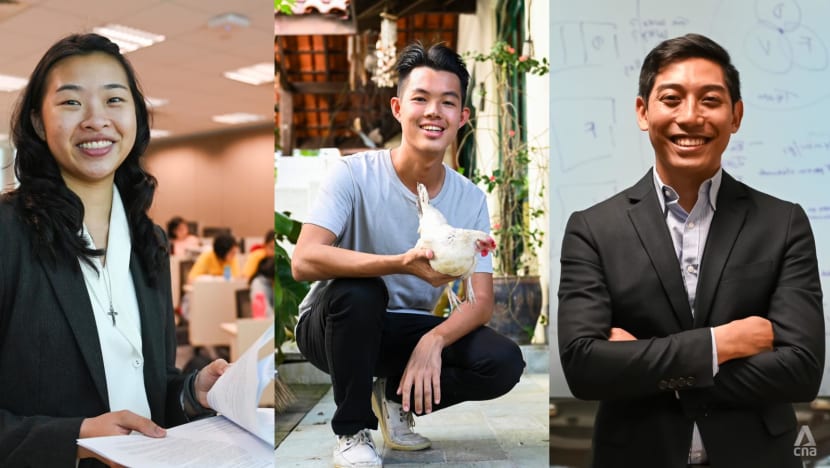
Different paths, common passion for sustainability: (from left) Selene Tanne, Julian Lee and Safafisalam Bohari Jaon. (Photos: Christy Yip/CNA)
- Green jobs have gone beyond a market niche to industries ranging from renewables to finance and transport.
- Youths with environmental knowledge or technical skills are glad to have options; it can still be challenging switching careers, despite their passion and upskilling efforts.
- One industry report found a “mismatch” between what youths are looking for and where the green jobs really are.
- After overcoming obstacles, some youths are helping others get a foot in the door.
SINGAPORE: Where would all the spiders go? That thought sparked Too Fang Ning’s interest as a child in how humans impacted the environment, as she watched a field next to her home turn to concrete.
She immersed herself in nature, learned about Singapore’s ecology and grew certain that she wanted to work in something environment-related, and “not just in (her) free time”, said the 23-year-old.
But for a while, it seemed that jobs for someone like her were mainly in niche areas like environmental impact assessments.
In the last few years, however, the environmental studies graduate has seen roles sprouting up in various sectors, from manufacturing to finance to communications. More and more “regular” companies were embedding sustainability in their day-to-day business and hiring sustainability professionals.
As countries including Singapore square up to climate change, there has been a concerted effort to cut carbon emissions from activities like power generation, transport and food production as well as protect forests and other ecosystems.
In 2021, when Singapore launched the Green Plan 2030, with targets such as quadrupling solar power deployment by 2025 and planting a million more trees, it highlighted the green economy as a growth engine that will bring about new jobs and new skills requirements.
This means people like Too have more opportunities than ever to pursue careers aligned with their passion. And growing numbers of young people are interested in these green jobs.
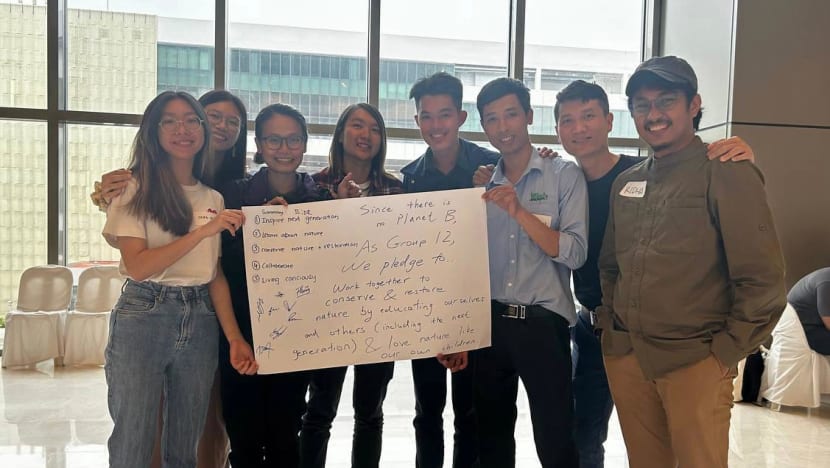
According to a report last year by professional services firm Accenture, which surveyed 29,500 people aged 15 to 39 across 18 countries including Singapore, 77 per cent of respondents in the Asia-Pacific aspired to roles in the green economy within the next decade.
But even as the roles increase in number, are young job seekers getting the green jobs they want? Is passion for the environment enough to secure a job?
CNA Insider spoke to a variety of youths in Singapore and found a mixed bag of experiences. While some had little difficulty finding their ideal job, others faced obstacles and detours despite a willingness to pick up the necessary skills.
FROM ECO ANXIETY TO HOPE
The anticipated green jobs boom is good news for those who have harboured such aspirations since childhood.
Selene Tanne, 23, remembers looking up jobs in sustainability when she was at secondary school and feeling “despair” about the lack of opportunities.
“I always had … anxiety about the environment. It was a very real thing that I struggled with as a child,” she said. “But I had no idea how to channel it or do anything about it.”
Back then, she got the “dominant impression” that working in the sustainability field in Singapore meant “either you go work in the National Parks Board or you be some hippie campaigner”.
She went on to pursue her other interest, law, and chose to study in the United Kingdom to expose herself to environmental law in Europe, where there were more environmental developments and regulations.
Even then, her interest was not always perceived as an advantage. When she was applying for traineeships in the UK, she was advised not to focus too much on the environment as it would make her a less attractive candidate.
“The consensus among friends who were more environmentally conscious was the sense of almost despair,” she said. She came home amid the pandemic in 2020 and, by the next year, saw a very different picture.
There was “an explosion of jobs” focused on sustainability, from public policy to compliance. Friends began sharing anecdotes about the green jobs they had landed, for example in a start-up trying to make the food supply chain more sustainable.
After she completed her law degree in 2021, she started working full-time as a research assistant at the Asia-Pacific Centre for Environmental Law (APCEL) at the National University of Singapore (NUS).
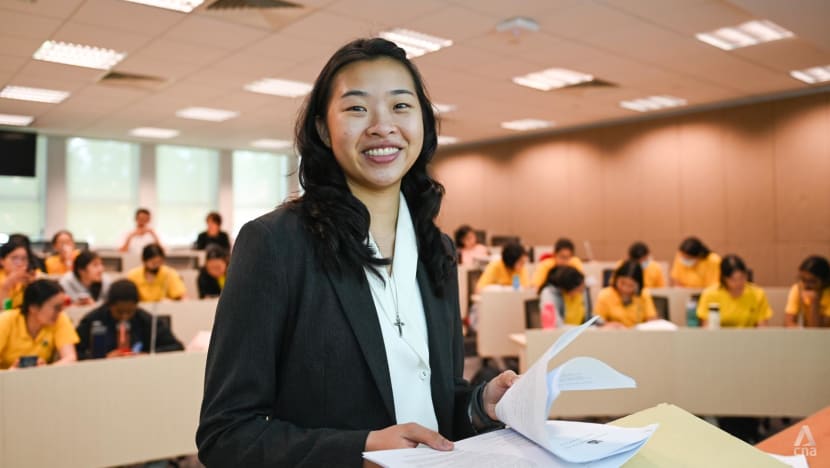
It came after her stint as a pro bono intern just before her final year. She found the work “electrifying for the brain”.
That passion for advocacy she’s always had has now found its place in teaching and research. This year, she was appointed a Sheridan Fellow at NUS Law. It is a fellowship “to groom the next generation of law academics in Singapore”, Tanne said, and her specialty will be environmental law.
As for Too, whereas her peers felt doom and gloom about climate change, she saw a problem that could be solved. She was particularly interested in how corporations could do more for nature “without dragging their feet”.
What caught her eye leading up to her graduation this year was environmental, social and governance (ESG) investing, which has emerged in recent years. It takes account of environmental, social and corporate governance factors when evaluating companies and making investment decisions.
Seeing a shift in companies’ attitudes towards sustainability — from something to comply with to perceived risk and opportunity — encouraged her. In June, she began work in the ESG team at an investment firm.
A SENSE OF PURPOSE AND JOB SECURITY
In Singapore, Accenture has found the highest demand for green skills in water treatment, environmental engineering, renewable energy and climate change, said Mark Tham, its country managing director for Singapore.
According to government agency SkillsFuture Singapore’s Skills Demand for the Future Economy 2022 report, jobs with high demand growth lie in areas like green facilities management, carbon markets and decarbonisation strategies, sustainable investment management and photovoltaic energy assessment.
This has opened pathways for youths who have the technical skills but maybe not an avid interest in environmental issues.
Take, for example, Lim Kang, who studied materials science at university because it offered “the greatest possible options in terms of specialisation in different industries”.
Given his parents’ pharmaceutical careers, the 26-year-old might have gone into the biomedical industry. But a series of part-time jobs and internships at solar energy companies opened his eyes to the renewable energy sector.
“Towards the later part of university, clean energy kind of boomed or gained a lot of traction. So it also gives me some sense of security (to be) moving towards this space,” said Lim.
“We need a lot of new people to do a lot of research (and) engineering work for all the components and … materials for (the industry).”
Indeed, there was no shortage of jobs after he graduated last year. Lim applied to four solar companies for both corporate and engineering roles. The job search took two to three months, and eventually he joined clean energy provider EDPR as a business development executive.
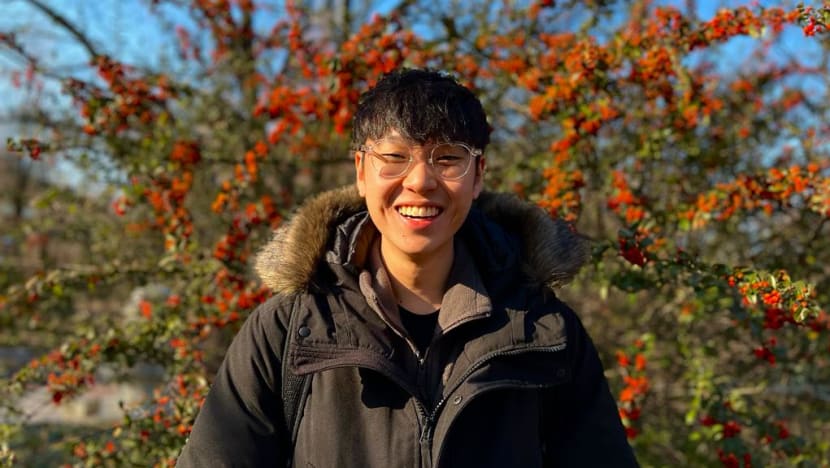
He serves clients looking to install solar panels at their existing buildings and explains how the system works. His main pitch to them is entirely pragmatic: A reduction in electricity bills.
Besides the bright prospects in the sector, Lim “feels good” to know his job “has a sense of purpose and (serves) a greater good for the environment”. He added: “Not just something that’s very money-oriented.”
HURDLES IN SWITCHING CAREERS
While many youths in the Asia-Pacific aspire to a career in the green economy, Accenture’s Youthquake Meets Green Economy report last year found that many of these jobs do not yet exist, while others are in their infancy.
This is perhaps why not all who were looking to get into sustainability have had an easy time, despite their keen interest and willingness to learn.
Safafisalam Bohari Jaon, also known as Safa, spent two years as a data analyst in an insurance company before he decided to use his skills for causes closer to his heart.
“Environmental issues have always been there, but I’d never felt that I had much agency … other than (using) the right recycling bin, (showering) faster or something,” said the 27-year-old.
“(But) you can only care about something if you put effort into caring about it.”
As he began searching for something he could do in a professional capacity — roles where he could apply his digital and data analytics skills — he felt he had to leave his first job to find a footing in sustainability.
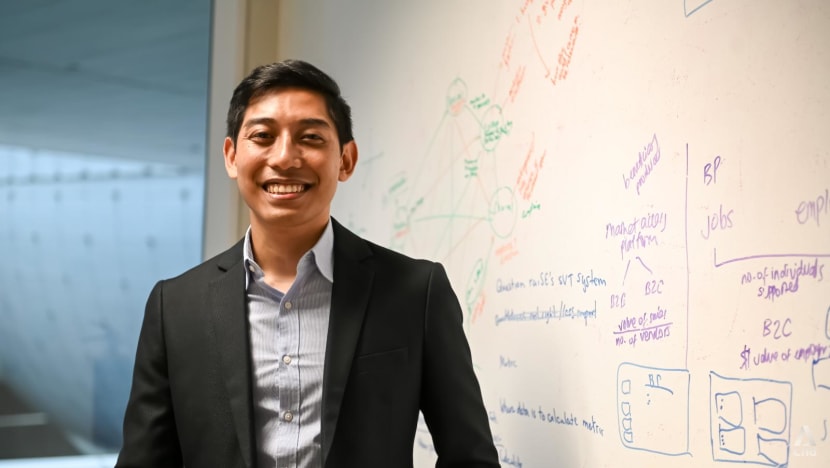
While most listings, he said, were looking for candidates with a qualification in sustainability, he hoped his volunteering experience and involvement in his previous company’s sustainability initiatives could make up for it.
Some roles he considered were product manager in a start-up that traced data in the natural rubber supply chain and account manager in the built environment industry. Both, however, felt too niche for his liking.
Safa recalled starting to get “really nervous” by the third or fourth month of his job hunt, as he had got fewer than five interviews.
“(I started to think), are my standards too high? Am I expecting too much in the career switch? Do I need to take something that doesn’t align with what I want to do and then slowly work my way up?”
Julian Lee, too, left his first job as a cloud engineer in a technology services firm after just over a year to pursue his passion for ecology.
At university, he had chosen electrical and electronic engineering simply because he was good at mathematics and physics. But he realised engineering was not what he wanted to do in the long term.
“It’s a bit spiritual, but when I thought about … being called to serve the world, my mind (turned) to ecology or sustainability,” said the 27-year-old.
“Nature’s always been something I like. I live right next to a park. I go (for) walks whenever I’m troubled or need some fresh air. I think it’s helped me a lot.”
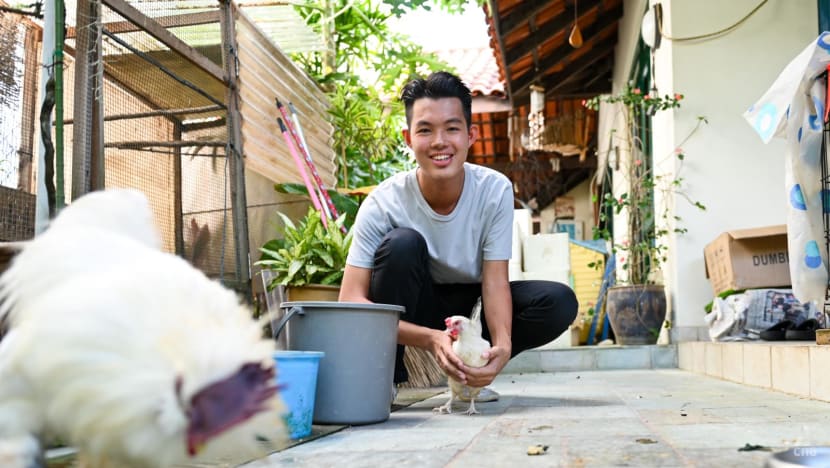
He started volunteering in a few places such as the non-profit Ground-Up Initiative, which focuses on sustainability and community building. He farmed, did woodwork and helped to lead volunteer programmes.
He also signed up for courses in skills he lacked, such as ESG report writing. Twice, however, that course was cancelled owing to insufficient enrolment. “It was a bit disheartening,” he said.
His career break went on for about nine months, during which he sent out 34 applications. He had a couple of interviews: one for the role of communications and engagement research assistant at an academic institute and another as a project engineer in an energy company.
He acknowledged that he was “quite idealistic” as he did not apply only for jobs suited to his skill set or entry-level status.
With his savings running low, Lee recently decided to work as a data analyst while continuing to volunteer. Data analysis may come in handy for any future role in sustainability, he reasoned.
THREE TIPS
What lessons, then, can those aspiring to be sustainability professionals draw? Youths and employers shared these tips:
• Network with many people
That was how Safa “serendipitously” found his current job at Eden Strategy Institute, a consultancy that helps clients reach their sustainability and social impact goals. He met his boss at a human-library event last year for sustainability and upskilling.
He talked about wanting to use his data analytics skills in a more impactful way, in sustainability, but without being “boxed in” by any particular industry, and the next thing he knew he was meeting his future boss for coffee.
Safa received a job offer as sustainability consultant and joined the company last December. “(For) anyone wanting to get into sustainability, it’s about putting yourself out there and talking to as many people in the field (as possible),” he said.
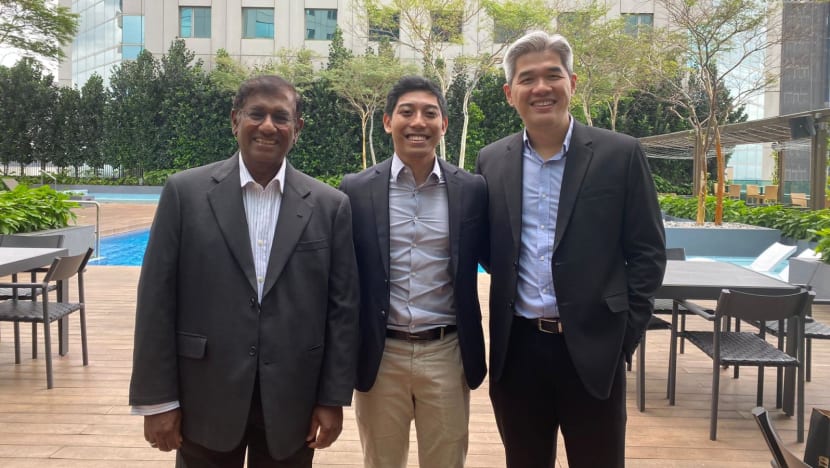
Hazel Chan, meanwhile, was halfway through her business and communications degree course when she set her heart on a job in sustainability. It would give her a strong sense of purpose and pay decently, she thought.
From then on, she threw herself into internships and networking with anyone in the field who was willing to share insights.
She connected with people on LinkedIn and asked for video chats, to find out their likes and dislikes about their job, the skills required and what roles were most attainable for people like her without a technical and environmental background.
The 26-year-old decided she wanted to do sustainability consulting or work in-house for a company, helping to calculate and manage its emissions.
• Work hard for it
What Chan lacked in skills, such as knowledge of the various reporting frameworks, she made up for by attending courses she could afford.
But when she graduated in April, she was disappointed to find most companies were looking for candidates with two to three years’ experience for the roles that had interested her.
Out of about 20 applications, she received a handful of callbacks. “I felt like I’d spent the last two years trying to grow a portfolio, but it wasn’t enough,” she said.
Chan mostly did not make it past the first round of her interviews. In her final interview, she switched tack: Instead of emphasising why she wanted to work in sustainability, she demonstrated how she had “carved (out) her own pathway”.
She landed a role as a sustainability and communications executive in a multinational food manufacturer and started this month. Her responsibilities include putting together the company’s yearly sustainability report, accounting for its carbon footprint and monitoring regulations.
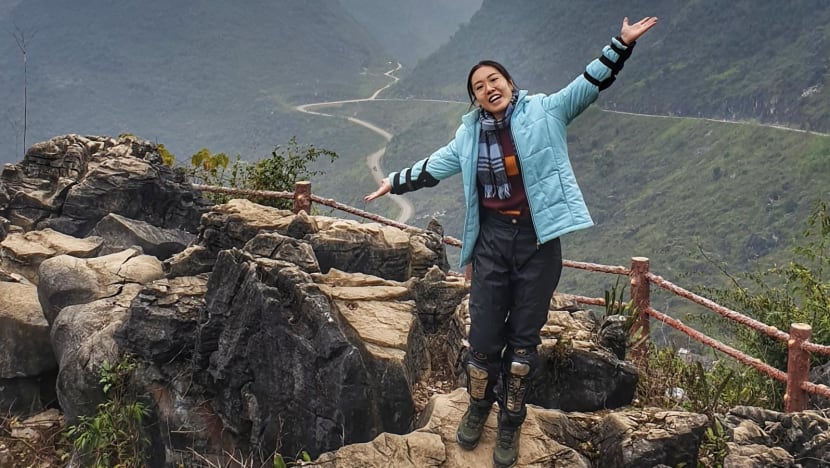
• Be prepared for complexity
Working in sustainability may be attractive to many young people, but “the amount of effort that goes (into making) things sustainable” is considerable indeed, warned energy solutions entrepreneur Avishek Kumar.
The search for innovative low-carbon solutions is also “really hard”, said the chief executive officer, whose start-up VFlowTech makes low-cost, efficient and modular vanadium redox flow batteries, which can store renewable energy over a long duration.
In his company, there is “no luxury” of simply sitting in an office. “We’re building batteries, and batteries are built in harsh environments,” he said.
As there may not be predefined business models to follow, employees must be prepared for complexity, he advised.
It has been “very hard” to hire people in electrical engineering and project management, said Avishek, who has a doctorate in solar technology. Generic roles such as in human resources are easier to fill.
Accenture’s research points to “a mismatch between what youths are looking for and where the green jobs really are”, said Tham.
Besides the fact that some jobs do not exist yet, youths should know green jobs are not all about high-end degrees and knowledge work. Many will require the grit found in construction and manufacturing, the two industries with the greatest green job potential, Accenture reported.
EMPLOYERS MUST UP THEIR GAME
The other side of the coin is that employers should roll out more mentorship programmes and traineeships for those who are keen on working in sustainability, youths and experts said.
“It’s very hard for people to make a jump into a space as nascent, complex and confusing as this,” said Safa. What inspired him during his job search were industry practitioners he met who did not have sustainability backgrounds.
“It’s very difficult to get the right talent into your company if you’re only going to be looking at people who studied (sustainability) in school,” he added.
A big part of sustainability, I think, comes with caring. And there’s no qualification for (how much you care).”
In its Youthquake Meets Green Economy report, Accenture said companies can appeal to young job seekers in several ways.
These include offering employees creative freedom and facilitating unusual combinations of expertise, such as climate science and artificial intelligence, or chemical engineering and innovation.
Companies can also create new green businesses that are decoupled from their legacy businesses, and build “internal capabilities for sustainability in all business divisions, which could include introducing and tracking new sustainability key performance indicators”.
And to make opportunities more accessible, companies could invest in skills certification programmes for incoming semi-skilled or unskilled workers as well as create more specialisation pathways.
Meantime, some youths are paying it forward by helping the younger ones.
To help like-minded fellow undergraduates, Too, who had been tracking green jobs on an Excel sheet to prepare for graduation, went a step further and organised a green career fair at NUS in January.
As the outreach director of the environmental studies student committee back then, she invited 12 organisations from various sectors to provide updates on career pathways. She estimates that there were about 300 attendees from faculties across NUS, including business, computer science and arts and social sciences.
“A common challenge is that sustainability is very broad, and no one knows where to start,” said Too. “So the career fair is like a shallow swim rather than a deep dive into what lies out there.”
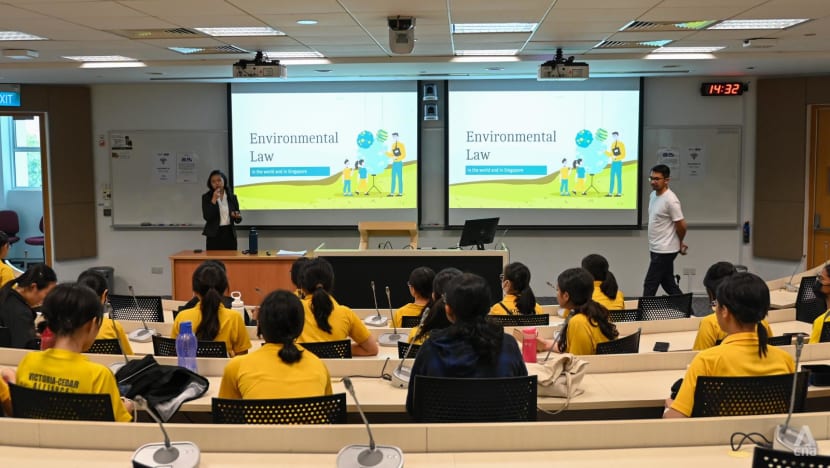
Chan, meanwhile, started a podcast called Kickstarting a Green Career and invited sustainability professionals, such as a sustainability manager and an impact investment analyst, to share their job experiences. She also started a related LinkedIn page to post resources and learnings, such as explanations of ESG jargon.
“I really struggled. … I’m still on a journey to understand the whole spectrum of job roles available in sustainability,” said Chan. “It’s just so broad — now every job’s called a green job.”
Her goal is to help others understand what a job in sustainability is like, she said.
Over at APCEL, Tanne started a student outreach programme last year, in which speakers from the centre introduce secondary school and junior college students to international and domestic environmental law and policy as well as expose them to higher education institutions where they could pursue these interests.
“It’s what I wish I had,” said Tanne. “I wanted to create a programme where kids have that space to learn about (environmental issues), become at least environmentally or sustainability-literate, (and) when (the) time (comes) for them to choose what they want to do, at least they have that option.
“It’s also not about making people environmental specialists, but rather (about) helping to make sure everybody — regardless (of) whether you’re an accountant or environmental lawyer — has that commitment to doing good for the environment.”
For Lee, despite the disappointment when he recently tried to “give back to nature”, it is not the end of his sustainability aspirations.
“It’s just a matter of time or how many detours I have to take before I reach my final destination,” he said.
Interested to bring APCEL’s student outreach programme to your school? Contact lawapcel [at] nus.edu.sg.










